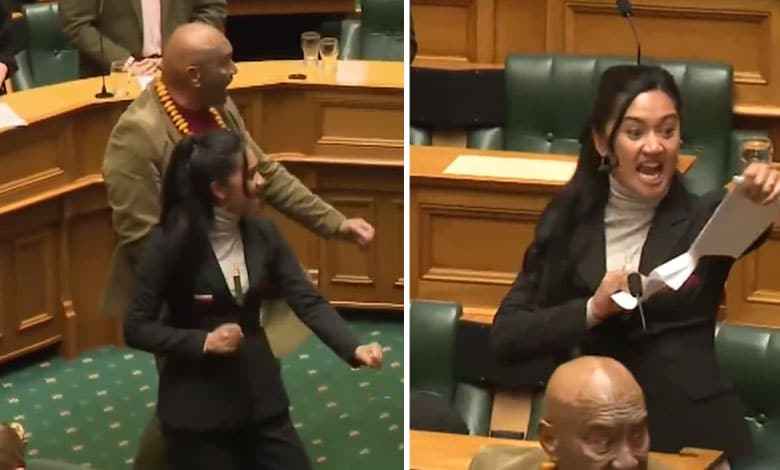New Zealand Parliament Suspended Amid Controversial Māori Rights Bill Protest
The New Zealand Parliament was briefly suspended on Thursday, November 14, following a dramatic protest by Te Pati Māori MPs over a controversial Māori rights bill.

Wellington: The New Zealand Parliament was briefly suspended on Thursday, November 14, following a dramatic protest by Te Pati Māori MPs over a controversial Māori rights bill. The protest included a traditional haka dance and heated debates, reflecting the deep divisions in the country over the proposed changes to the interpretation of the Treaty of Waitangi, New Zealand’s founding document signed in 1840.
Table of Contents
Māori MPs Perform Haka Protest in Parliament
The incident unfolded during a preliminary vote on the bill, which proposes significant changes in the interpretation of the Treaty of Waitangi, which has long been central to the relationship between the Māori people and the Crown. As Parliamentarians gathered, Te Pati Māori MPs, led by Hana-Rawhiti Maipi-Clarke, stood up and began performing the haka—a ceremonial Māori war dance—following an act of defiance where she tore the bill in the chamber.
The haka, a symbol of Māori culture and resistance, was an intense show of opposition to the bill. The legislation, which seeks to legally define the principles of the Treaty, has ignited a fierce debate about its potential impact on Māori rights and New Zealand’s multicultural society.
The Controversial Māori Rights Bill
The bill is designed to formalize the interpretation of the Treaty of Waitangi in New Zealand law, and particularly focuses on the rights of Māori, the country’s Indigenous people. Critics argue that the bill undermines the treaty and threatens Māori privileges while fostering anti-Māori sentiments. They view the changes as a dangerous erosion of Indigenous rights that could widen the divide between Māori and non-Māori communities.
The Treaty of Waitangi, signed between 500 Māori chiefs and the British Crown, has been integral to ensuring Māori rights and has been upheld through decades of court rulings and tribunal processes. These rulings have ensured the participation, partnership, and protection of Māori people within New Zealand’s political, social, and economic framework.
However, some opponents argue that the bill proposes policies that will discriminate against non-Indigenous citizens and institutionalize privileges for Māori that they claim go beyond the principles of equality.
Public Outcry and Marches in Protest
The haka protest in Parliament comes on the heels of significant public opposition to the bill. Hundreds of Māori protesters have begun a nine-day march (known as a hikoi) from New Zealand’s northern regions to the national capital of Wellington. The march is expected to culminate in a mass rally in Wellington next Tuesday, with tens of thousands of people anticipated to participate in the demonstration against the bill.
Political Divide Over the Bill
In Parliament, the speech delivered by David Seymour, leader of the ACT Party, defending the bill, faced sharp disapproval from opposition members. Seymour argued that the bill would clarify the definition of the Treaty of Waitangi and end 49 years of silence on the issue. However, his comments sparked outrage from opposition MPs, who accused him of promoting anti-Māori rhetoric.
Meanwhile, over 40 prominent King’s Counsel lawyers have signed an open letter calling on Prime Minister Christopher Luxon and Attorney General Judith Collins to reconsider the bill, warning that it could have long-term repercussions for Māori rights and social cohesion in the country.
Next Steps for the Māori Rights Bill
The Justice Committee will begin hearing submissions on the bill, a process that is expected to take around six months. After that, the bill will return to Parliament for a second reading, where it will likely spark further debate and protests.
